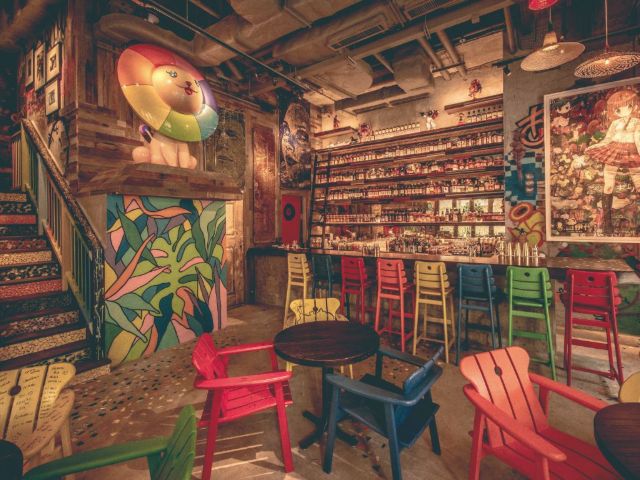A length of fresh dough lies on the worktop. The chef liberates a thumb-sized piece, rolls it into a ball and presses the plane of his cleaver down on it. A near-perfect circle of flattened dough emerges beneath the blade, so thin you can almost see the metal kitchen counter through it. Into this he places a spoonful of shrimp mix, before expertly cinching the dough around it, creating small folds with one hand while pressing it closed with the other to reveal a perfectly formed har gow. This shrimp dumpling is then steamed, the pink flesh visible through a fine, translucent skin.

The skill of a dim sum chef is exemplified in a dumpling like har gow: the wrapping must be thin enough to see through yet thick enough not to break when handled with chopsticks; there is a preferred number of pleats — at least seven for har gow; and an ideal level of stickiness — it shouldn’t cling to other dumplings or to the paper in the base of the bamboo steamer. The filling should be perfectly cooked, too. So many considerations for this small morsel — and then it’s gone in one fell bite.

Dim sum travelled to Hong Kong from the Chinese port city of Guangzhou and has become an essential part of Cantonese cuisine. The name dim sum refers to the small savoury and sweet items served during the meal known as yum cha, meaning ‘drink tea’, which is today a social gathering typically held in the morning though increasingly for brunch and lunch. Each order of dim sum usually contains three or four pieces, and is intended for sharing.

In traditional yum cha restaurants, tea is ordered first — it’s poured by the person nearest the teapot who fills their own cup last, while fellow diners can tap the table with three fingers in thanks. The story goes that a Qing dynasty emperor used to travel in disguise and while taking his turn to pour tea during yum cha, accompanying officials showed respect by tapping three fingers.
In traditional dim sum eateries, bamboo steamers and other items are served from trolleys, but increasingly diners will mark up a checklist, with orders delivered direct from the kitchen. They arrive hot, but can be cut with chopsticks both to cool and to share. If serving others, remember to use the table’s communal chopsticks, rather than your own.

The essence of dim sum is the hand craftsmanship. It’s not a dish where you can find a recipe and imitate it easily at home. It requires skill and years of training,” says Saito Chau, a chef with vast experience in contemporary Cantonese cuisine. “It’s the attention to detail, precision and the human touch. The handmade element is irreplaceable.” There is however, room for innovation and, in recent years, dim sum has undergone an evolution, both aesthetically and in terms of ingredients.

“You can see western influence in Chinese cuisine, including dim sum, in terms of creativity, presentation and choice of ingredients,” says chef Leung Kin-wai, head dim sum chef at Shang Palace at the Kowloon Shangri-la who has been creating dim sum for almost three decades.
“A recent trend has been to do colourful dim sum or to add faces, and people loved it for Instagram. But today I think people want to focus on the quality of the food — the ingredients and how you cook it, more than just the visuals,” says Chau, who elevates his dim sum by using premium ingredients and sustainable produce, from Iberico pork fillings for his BBQ pineapple and pork puffed buns, to sustainably sourced prawns in his tiger prawn har gow, and free-range, organic chicken, which he incorporates into an alternative take on siu mai. More widely, dim sum chefs are removing lard from dim sum recipes, to make certain items completely vegetarian or to replace it with a healthier option.

“In our hearts we still want to focus on the traditional Cantonese cooking but to bring new ingredients and techniques to make it more interesting. It’s important for chefs to balance creativity with traditional authentic elements,” says Chau.
“To be a good dim sum chef today you have to think outside the box and be creative, but you can’t lose the basics, those traditional skills to make dim sum,” adds chef Leung. “And, most importantly, you have to use your hands and put your heart into it.” Dim sum, after all, translates as ‘touch of the heart’.
Hong Kong has no shortage of quality dim sum — traditional, modern and everything in between — that can be enjoyed all over the city in eateries ranging from small family cafes to Michelin-starred restaurants. Dim sum items range from seafood and meat to vegetable items, and can be steamed, fried or baked. For an authentic dim sum experience, essentials include:

Har gao
Steamed dumplings containing a shrimp filling.
Siu mai
Usually a mix of shrimp and pork (though sometimes mushrooms or other vegetables) cupped in a dumpling wrapper and topped with crab roe.
Char siu bao
Fluffy white buns containing a filling of ever-so-slightly sweet barbecued pork.
Cheung fan
Wide, flat rice noodles rolled around shrimp, barbequed pork or other meat or vegetables, topped with seasoned soy sauce.
Xiao long bao
These soup dumplings were once described by celebrity chef Anthony Bourdain as 'pillows of happiness'. Their thin wrappers give way to tender pork and a rich soup best enjoyed, like most dim sum, hot.
Information in this article is subject to change without advance notice. Please contact the relevant product or service providers for enquiries.
The Hong Kong Tourism Board disclaims any liability as to the quality or fitness for purpose of third party products and services; and makes no representation or warranty as to the accuracy, adequacy or reliability of any information contained herein.






 Live Chat
Live Chat









